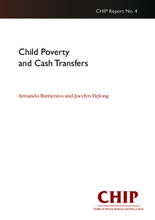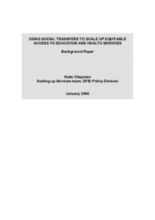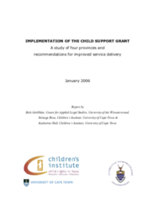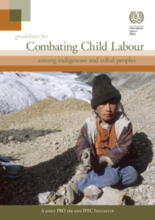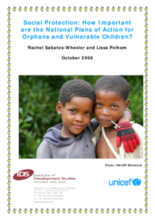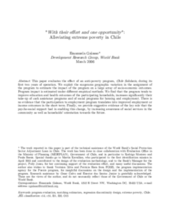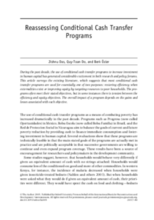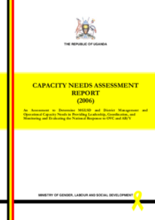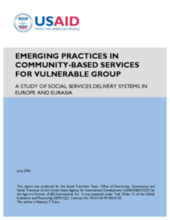Displaying 391 - 400 of 455
This paper examines the effectiveness of targeted cash transfers programs on reducing childhood poverty. It also explored the comparatives effectiveness of different kinds of cash transfers.
This paper focuses on the impact of one form of demand-side policy option - social transfers, particularly cash transfers and vouchers - on access to health and education services by the extreme poor.
Using fieldwork data from six sites, this report addresses the need for improved delivery of the Child Support Grant in South Africa. Includes a comprehensive review of the grant components and current system of delivery. Recommended changes to the act and regulations are highlighted.
Guidelines to address the specific needs and rights of indigenous children in the context of child labour. Includes a comprehensive list of follow-up resources.
This briefing paper emerges from a review of 14 national plans of action (NPA), or in the absence of a NPA, outputs from the rapid assessment analysis and action planning (RAAAP) work for orphans and children made vulnerable by HIV/AIDS. The purpose is to analyse the way that issues of social protection are incorporated into these plans and to highlight areas within the plans where social protection activity may be needed to achieve stated outcomes. Annex 3 summarises, country by country, the social protection content of each NPA.
Evaluates the effect of an anti-poverty program, Chile Solidario, during its first two years of operation. Estimate the impact of the program on a large array of socio-economic outcomes including education, health, housing, and employment. Finds also suggest the key role that psycho-social support had in enabling this change, by increasing awareness of social services in the community as well as households’ orientation towards the future.
Overview of social protection and welfare directions around the world, with recommendations for policies to protect vulnerable children and those affected by HIV/AIDS in Africa.
This article reviews the existing literature on conditional cash transfer programs around the world. It urges the careful consideration of multiple factors in program planning and policy making to achieve successful long-term outcomes.
An Assessment to Determine MGLSD and District Management and Operational Capacity Needs in Providing Leadership, Coordination, and Monitoring and Evaluating the National Response to OVC and AB/Y
Examines the transition from residential care to family-based, community care models in five European / Eurasian countries.

